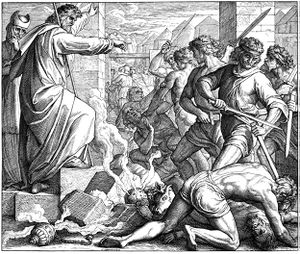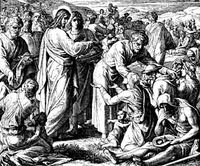Early Israel: Difference between revisions
No edit summary |
No edit summary |
||
| Line 3: | Line 3: | ||
: [[Early Israel]] was not like Judea at the time of Christ. | : [[Early Israel]] was not like Judea at the time of Christ. | ||
: [[Early Israel]] had [[no King]]. | : [[Early Israel]] had [[no King]]. | ||
: [[Early Israel]] depended upon [[freewill offerings]] in the form of [[ | : [[Early Israel]] depended upon [[freewill offerings]] in the form of [[tithe]]s to support their public servants. | ||
: This changed when the ''[[voice|voice of the people]] rejected God'' and chose to have a leader who could [[exercise authority]] one over the other. | : This changed when the ''[[voice|voice of the people]] rejected God'' and chose to have a leader who could [[exercise authority]] one over the other. | ||
: Despite the [[1 Samuel 8|warnings of Samuel]] the people wanted a ruler rather than a mere leader. | : Despite the [[1 Samuel 8|warnings of Samuel]] the people wanted a ruler rather than a mere leader. | ||
Revision as of 18:45, 3 October 2017

- Early Israel was not like Judea at the time of Christ.
- Early Israel had no King.
- Early Israel depended upon freewill offerings in the form of tithes to support their public servants.
- This changed when the voice of the people rejected God and chose to have a leader who could exercise authority one over the other.
- Despite the warnings of Samuel the people wanted a ruler rather than a mere leader.
- That Rule by the name of Saul was corrupted by the power granted by the people and foolishly imposed the first real tax upon the people.
- At his time Israel went from a Republic to a centrally controlled government.
- It never really was restored until Jesus the Christ came taking the kingdom from the Pharisees and appointing that kingdom of God to the apostles.
Jesus and Moses were in agreement but the Pharisees did not know Jesus because they did not know Moses. They thought they did but Jesus said they did not.

They all read the Torah but through sophistry and vanity that had turned the religion of Israel into a false religion and belief system that was actually making the word of God to none effect.
Understanding the similarities and differences between the Church in the wilderness and the Church is essential. They were both called out. The Levites and the "ekklesia" or Church appointed by Christ had a similar purpose. They both helped form altars of living clay and stone appointed by men like Abraham Moses and Jesus.
Do Modern Christians understand Jesus or does their Corban make the word of God to none effect again?
Are they practicing Pure Religion?
Are they indulged in Covetous Practices that will entangle them again in the elements of the world and a yoke of bondage, make them merchandise and curse their children?
- Everyone should step back and think about how did the early Church survive the decline and fall of the Roman Empire...?
- How did early Israel bind itself as a nation in a hostile world as the children of God?
- The Christian conflict was not simply because they would not be a part of the Corban of Rome but because they had their own Daily ministration.
If you need help:
- Or want to help others:
Join The Living Network of The Companies of Ten
The Living Network |
Join Local group |
About |
Purpose |
Guidelines |
Network Removal
Contact Minister |
Fractal Network |
Audacity of Hope |
Network Links